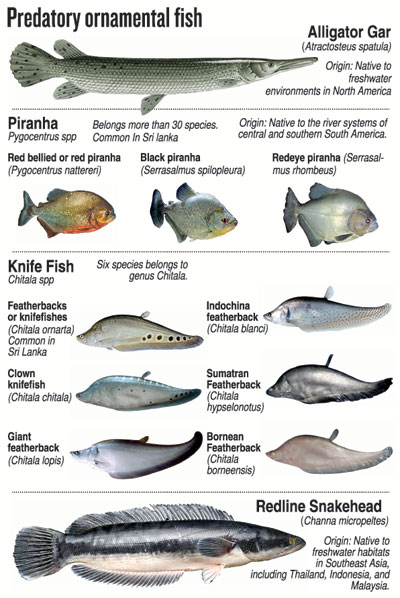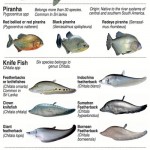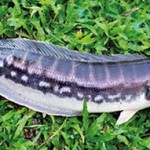News
Doubts over proposed ways to get rid of invasive, harmful fish
View(s):By Kasun Warakapitiya
A move to systematically remove four invasive fish species from being reared, bred and distributed has been received with a mixed reaction by hobbyists, while pet shop owners expressed concern.
The four fish species are harmful to the environment, being highly carnivorous, exhibiting rapid growth and having a high reproduction rate. They are invasive and a threat to endemic fish, disrupt ecosystems and badly affect inland fishing, according to authorities.
These invasive fish have the potential to harm even humans.
The Fisheries Department issued the gazette on Friday banning piranha (Pygocentrus spp.), alligator gar (Atractosteus spatula), knife fish species (Chitala species) and redline snakehead (Channa micropeltes).
The banned invasive fish: From left – Piranha, Alligator Gar, Knife fish and Red line snake head
The gazette had been issued in parallel with an angling tournament in Deduru Oya, where angling associations had registered to capture and remove redline snakeheads.
But scientist Dr Rohan Pethiyagoda said, “The ban is meaningless given that these fish have been freely available in local ornamental fish shops for decades. I see that even possession has been banned. So what will people keeping these fish do to comply? They’ll release them to the nearest water body.
“There are now more species of foreign fish in Sri Lankan waters than endemic fish. The vast majority of these species have been introduced by the Fisheries Ministry, ironically the very ministry that is now trying to shut the stable door after the horse has bolted. Anglers trying to catch these fish will certainly have a great time, but that’s all. The species cannot be eradicated by angling. The juveniles will not be caught this way.’’
Most aquarium fish hobbyists who were rearing the four species are disappointed.
The youths who keep exotic fish as pets were the most defensive and will not hand them over.
They threatened on social media that if they are unable to keep the fish, they would release them to nearby natural water sources. They called it a media show.

One such post on social media explained why owners would be reluctant to hand over fish. The fish costs thousands of rupees, and the cost of care is hundreds of thousands of rupees. Large containers and transport of fish will be costly.
Some other posts pointed out that the ban would make fish keepers and pet shop owners panic, and they will illegally release the fish in lakes and streams.
The aquarium and pet shop owners, as well as aquarium industry associations, blamed the authorities for not mentioning the procedures being taken first. They are also sceptical about whether staff are available to monitor home aquariums as well as infrastructure to house fish that will be handed over to them.
The president of the Kolonnawa Aquatic Society, Roshan Priyadarshana, told the Sunday Times that imports and illegal entry should be halted. The ban is with good intentions, but it has been rushed, overlooking practicality and actions needed to systematically remove the fish from being imported, reared, and bred.
Mr Priyadarshana said some have already hidden their stock.
In a gazette issued Friday, the National Aquatic Development Authority (NAQDA) said a three-month grace period will be given.
The Chairman of the authority, Kithsiri Dharmapriya, told the Sunday Times that there are three options for those who possess the four banned species: re-exporting them, both imported and locally bred; licensing and registering persons willing to keep banned fish species; and collecting unwanted fish by NAQDA.
Importers and breeders who have large quantities of live fish would be allowed to export fish, while private exotic fish enthusiasts would be allowed to keep their pet fish after registration and annual licensing on condition that they inform and provide evidence-based confirmation of the death of the fish under their care.
Mr Dharmapriya said that after a fish dies, the licence would be cancelled, stopping the fish owner from raising the banned species.
If a fish owner, breeder or importer decides to hand over their fish, they can contact the district aquaculture extension officers.
Fish handed over would be sent to National Zoological Gardens.
NAQDA warned that within three months, the grace period would end, and legal action as well as a Rs 50,000 fine would be imposed. If the new Fisheries Act is approved, the fine would rise to Rs 500,000.
| Captive breeding considered The National Aquatic Development Authority is in talks with the Department of Wildlife Conservation regarding the possibility of captive breeding of endemic fish for the aquarium industry. Chairman Kithsiri Dharmapriya said that breeding and rewilding projects of endemic fish species already exist. There is demand for local fish species in the ornamental fish industry, he said. If a legal mechanism with guidelines is set up, this could be developed into a revenue-earning method, which could also provide for the preservation of native species.
| |
| Zoo readies to take in fish The National Zoological Gardens, too, is readying to take in invasive fish species if the aquarium hobbyists hand over their fish. Director General Dr Chandana Rajapaksa told the Sunday Times that space is being considered in the aquarium in Dehiwala to collect and exhibit fish handed over to them. More tanks will be prepared at the animal rescue and rehabilitation centre at Kahapola. Fish feed project failed The Director of the Coastal Aquaculture Development Division of NAQDA, Gunasena Mahanama, said there have been efforts to remove the invasive tank cleaner (Common Pleco) dumped in natural waterways. A project to make ornamental fish food from their flesh was not successful. However, the Sunday Times observed that the same fish species is sold at aquariums. A huge colony of the same variety of illegally dumped fish is found at Nuwara Wewa in Kandy.
|
The best way to say that you found the home of your dreams is by finding it on Hitad.lk. We have listings for apartments for sale or rent in Sri Lanka, no matter what locale you're looking for! Whether you live in Colombo, Galle, Kandy, Matara, Jaffna and more - we've got them all!






